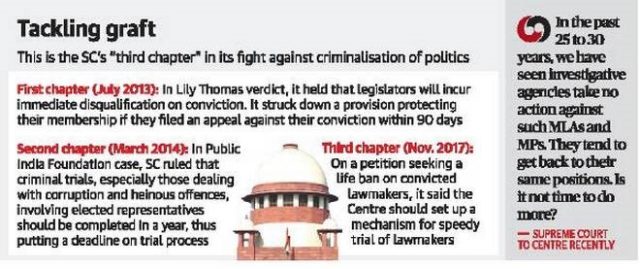PREVIOUS
Speed up trial of politicians-SC
November 2 , 2017
2581 days
1048
0
- Taking a step towards electoral reforms, the Supreme Court asked the government to frame a central scheme for setting up special courts across the country to exclusively try criminal cases involving ‘political persons.’
 Quick facts
Quick facts
Quick facts
Quick facts
- There are around 1581 criminal cases pending against MPs and MLAs at the time of the 2014 elections.
- In the current 16th Lok Sabha one third members have been registered with criminal cases.
- As per Representation of People Act 1951, if a elected representative is convicted of any criminal offence and sentenced to imprisonment for not less than 2 years shall be disqualified from the date of such conviction and shall be continue to disqualified for further period of 6 years since the representative release.
- In 2013 Lilly Thomas case verdict, Supreme Court held that legislators will incur immediate disqualification on conviction. It struck down a provision for an appeal against their conviction within 90 days.
- In 2014 Public India Foundation case, Supreme Court ruled that criminal trials, especially those dealing with corruption and heinous offences, involving elected representative should be completed in a year. Thus putting a deadline on the trial process.
Leave a Reply
Your Comment is awaiting moderation.


